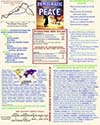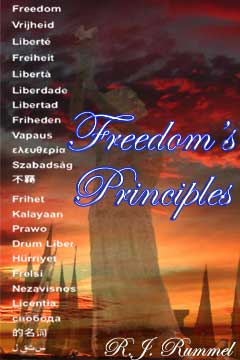
To understand alternative foreign policies and that of the democratic peace requires understanding their context, which is international relations, also known as world politics, transnational relations, global society. What is the essence of this arena of empires, international organizations, states, nations, governments, groups and individuals --this sphere of diplomacy and war, treaties and alliances, aid and trade, migration and tourists?
To understand this greatest human theater, we must recognize first that international relations compose our largest society. As a society (as do all societies), it has two faces. One is of conflict, change, a struggle and dialectic of power. The other is of an equilibrium in international norms and structures which describe, at any one time, this society. Indeed, without a conflict view of international society, the normal state of affairs is stability, of functions maintaining the society and adjusting states to it. Indeed, within this snapshot view, international conflict appears deviant -- an aberration. Consensus and equilibrium rather than conflict would be the defining characteristics of this society.
International society also can be seen as changing configurations of power and balancing. International states continuously enter into new power balances, behaving within existing structures of expectations undergirded by previous balances. These structures exist through time and can become increasingly crystallized, and develop a rule-inertia, which is the sociological counterpart of habit. Some structures of expectations (like the UN Charter) formalize law norms, which define the membership in the structure, the rights and obligations of members, and authoritative roles (positions).
International society is then a complex of informal (one should not lie or aggress) and formal expectations (treaties), involving both general social norms and the official law. It has a defined membership (states), law norms delimiting rights (sovereignty) and obligations (as defined in system wide multilateral treaties, like the UN Charter), and authoritative roles (the Secretary-General of the United Nations; the five permanent members of the Security Council).
Therefore, international relations form an exchange society. It is dominated by bargaining power, which involves international trade, treaties, agreements, tourist and student movements, migration, technical aid, capital flows, exchange rates, and so on. All these activities usually manifest some individual, group, or state giving up something they value for something else they want more.
This does not deny the role of coercion in international society, as in Obama’s demand that Israel freeze its expansion of settlements in the disputed West Bank or else (unspecified), or American use of sanctions to punish North Korea for testing potential nuclear missiles and Iran for continuing development of nuclear weapons,
In this international exchange society, states are generally free to pursue their own interests; social behavior is normally cooperative and contractual. Rewards and promises are the basis of the society. Treaties, commercial contracts, and written agreements provide its explicit framework.
This international society is governed by the United Nations, a libertarian government. The secretary General is its executive, and the General Assembly and Security Council, its lower and upper legislative bodies. The International Court of Justice is its judiciary; and the various international organizations, such as the World Health Organization, International Monetary Fund, and World Meteorological Organization, are its administrative structure. Sanctions are applied, as when the Security Council voted an embargo on Iraq due to its support for terrorism and WMDs. The UN may even support a major war as it did to defend South Korea from North Koreans aggression in 1950. Nonetheless, states can ignore UN resolutions. By international law, states are guaranteed the rights of sovereignty, independence, and equality. These rights take precedence over this world government.
International relations is therefore a confederation, the weakest form of federation, in which each constituent-member state retains sovereignty and a monopoly of force is denied the central government. Its functions are janitorial, meeting international crises when called upon by states; resolving international conflicts when requested; providing judicial judgments upon appeal; and above all, through the network of international governmental and non- governmental organizations, providing an administrative structure for international transactions among states, groups, and individuals.
In essence, international relations is an exchange society with a libertarian political system. No government monopolizes force, no empire encompasses all of international relations.
Contrary to the intuition of many, international violence does not distinguish international relations. It is more peaceful than many states. Some states and those areas under their control are governed by terror and repression, where arrests, beatings, torture, and possibly death at the hands of the government are a constant threat. Such was the case under Lenin, Stalin, Hitler, Pol Pot, and Mao. In the last century, states murdered about 262,000,000 people, while international and domestic wars accounted for about 55,000,000 war-dead.
Many believe international relations to be a state of nature: the relations between states are seen as though states were so many people living in a condition of anarchy, where each preys on the other and life is brutish and short. Each state is presumed to be insecure, all in a state of war, violence is the norm, and individual morality is alien to that of states. Coercive power is therefore supposed the regulator of international relations and diplomacy and war, its two faces. And therefore, a world government that monopolizes force, a global leviathan, is thought necessary to provide security and prevent violence. Many do not recognize that this state of nature is a fiction.
Just consider relations among Canada, the United States, United Kingdom, Australia, New Zealand, France, Belgium, Netherlands, Norway, Sweden, and Switzerland where there is simply no expectation of or disposition to violence. They are democracies. Problems arise in their relations, conflicts do occur, but none prepares for or entertains the possibility of violence against the other. They benefit, as do other democracies, from the democratic peace.
Indeed, the expectation of and disposition to violence between states is limited to very few bilateral relations, all involving nondemocracies, the most important of which today are the United States versus separately Iran, North Korea, and Russia; North versus South Korea; India versus Pakistan; Greece versus Turkey; Israel versus her neighbors and Iran; and Ethiopia versus Somalia. In a world of over 8,000 pairs of states, this propensity to violence is remarkably limited. In fact, because of the greater extent of transactions between nations and their contractual relations, international relations could better be characterized as a state of peace. This, especially in contrast to what goes on in many states.
Now, clearly, statesmen find the future essentially chaotic and unpredictable. They believe themselves governed by the "chain of circumstance." But as with violence, this unpredictability covers only certain relations for particular times. Much of international relations comprise clear expectations, high predictability, strong patterns. Conditions and patterns of trade, tourist regulations and flows, communications and transportation, diplomatic rules and principles, alliances and even the behavior that would cause a war, are known. We could hardly travel to another country or interact were it otherwise. Or does anyone doubt that at least a local war is most likely if the U.S. bombs Iran’s growing nuclear capacity?
International relations are no more chaotic than affairs within states. They are not anarchic. They are not normless, ruleless, nor lawless. They are not a state of war and violence is not the norm. States are not universally insecure. Coercion is not the rule. Rather, international relations comprise a global society and world culture with a limited government. Relations are generally harmonious, contractual. Bargaining power dominates. Reciprocity is the rule. Antagonism, conflicts, and violence exist, but generally less in intensity than within many states. Yes, states conflict, but it is astonishing that they do not conflict more often and more violently than they do.
In summary, in essence, international relations is an exchange society based mainly on bargaining power, not coercion or force, with a limited, libertarian world government.















No comments:
Post a Comment